Mid-century Americans bought cars based on their aspirations, not their needs, and success meant a large sedan. The oil shocks of the 1970s put a brief end to this (twice), but once prosperity returned so did the desire for a large vehicle--this time an SUV. Fast forward to the mid-2010s, and while premium brands are enjoying their strongest sales ever, and gas is fairly cheap (for the moment, anyway), an increasing number of people are buying only as much car as they really need. It turns out that even a compact crossover utility vehicle (CUV) like the Honda CR-V is more car than many people really need. Into the suddenly crowded segment below the CR-V Honda recently introduced the Fit-based 2016 HR-V--and it is already among the top sellers. Why? I compared the HR-V to the Chevrolet Trax to find out.
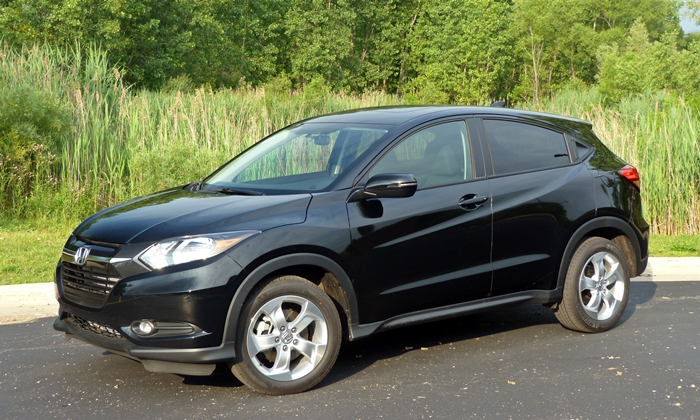
Not boring, yet also not overdone. Honda has finally rediscovered sporty, tasteful styling. more HR-V photos
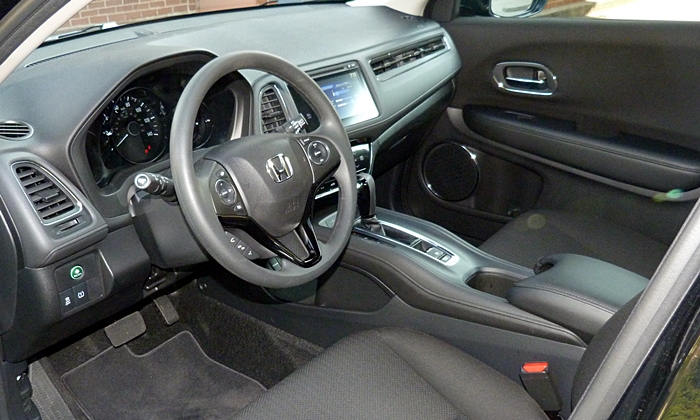
Aside from the "stitching," an artful interior. I especially like the curvy center console.
| |
Compared to the Trax |
| Reliability & durability |
 Better
Worse
Better
Worse
|
The 2016 Honda HR-V was very recently introduced, so we don't have any reliability information on it yet. But it's based on the Honda Fit, one of the most reliable models in our survey. Okay, the engine is shared with the Honda Civic--which is also very reliable. And not just for the first few years. The 2007 Fit and Civic, with a little over 100,000 miles on them, on average, have required only about as many repairs in the past year as the typical 2015 model, and about half as many as the typical 2007 model.
We also don't have any reliability data for the Chevrolet Trax, but what we do have for the closely related Buick Encore suggests that it'll also be very reliable, at least in the near term. Long-term reliability for the Trax is much more an unknown.
| Cargo capacity |
 Better
Worse
Better
Worse
|
Thanks to clever packaging--the fuel tank resides beneath the front seats, permitting the rear seat to fold unusually low--the Honda Fit (reviewed here) can swallow far more cargo than other cars in its class. The new HR-V shares this packaging, and consequently can hold five cubic feet more cargo than the Chevrolet Trax with its rear seat up (24.3 vs. 18.7), and ten cubic feet more with the seat folded (58.8 vs. 48.4). This is the case despite a sleek roof line nearly three inches lower than the squarer, more upright Chevrolet's. Also as in the Fit, the rear seat bottom can be folded up against the rear seatback, opening up a cargo space behind the front seats for tall items.
The Trax does have one cargo carrying advantage over the HR-V: its front passenger seat can fold forward to extend the cargo area for long items. The HR-V's front passenger seat can be folded way back to extend its cargo area, but this isn't as easy and it exposes the fabric seating surface to dirt and possibly damage.
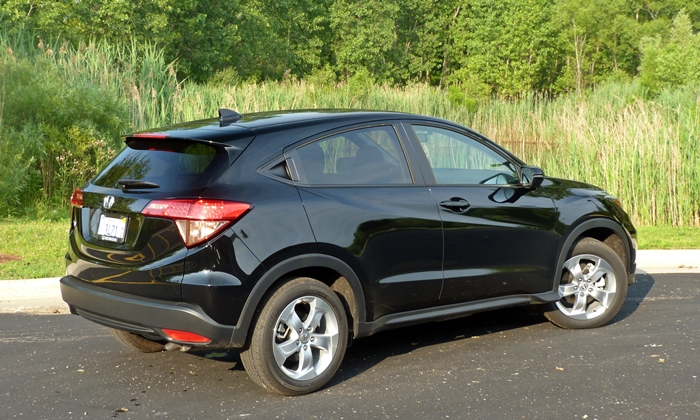
The body side's curves converge to a point--in which a door handle is hidden (perhaps too well).
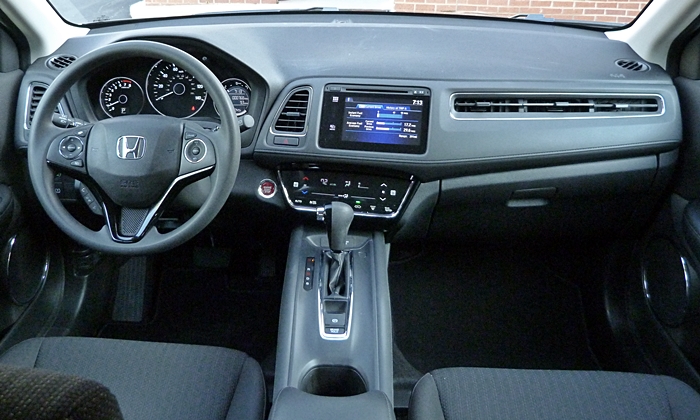
Want vents? the HR-V's instrument panel has plenty of vents. Want knobs? Too bad.
| Rear seat room & comfort |
 Better
Worse
Better
Worse
|
Also like the Fit, the Honda HR-V leads its class in rear seat spaciousness. with a large-sedan-like 39.3 inches of legroom to the Chevrolet Trax's still adult-worthy 35.7. Rear headroom is ample in both pint-sized crossovers. Given the ability to carry four adults with room to spare, it's no surprise that many people are deciding that they don't need a larger vehicle.
| Fuel economy |
 Better
Worse
Better
Worse
|
With EPA ratings of 28 mpg city and 35 mpg highway, the front-wheel-drive Honda HR-V nearly leads the class in fuel economy; that honor goes to the Mazda CX-3, with 29/35. Add all-wheel drive and they tie with 27/32. The Trax trails by a 2-3 mpg in the city and a single mpg on the highway.
In my real-world driving, though, the Chevrolet's trip computer reported better numbers than the Honda's. Was it accurate? I don't know. But if it was, the Trax was a little more efficient in my suburban driving, 37 mpg vs. 35 mpg, and considerably more efficient in my highway driving, 40 vs. 34 mpg. Granted, that the tested Trax lacked all-wheel drive could explain the observed difference in suburban mpg, if not the larger one in highway mpg. It should also be noted that the Trax's fuel efficiency is more dependent on driving style. Employ a heavy foot, and the tiny four's turbo will shove far more fuel-air mixture into the cylinders.
Since the EPA figures aren't terribly far apart and the trips computers cast some doubt on their accuracy, I've judged this category a tie. Drive either CUV casually, and you'll enjoy fuel economy well beyond the reach of most cars.
| Price or payments |
 Better
Worse
Better
Worse
|
Honda has priced the HR-V fairly aggressively, undercutting the Trax by about $1,900 before adjusting for feature differences, and by about $1,200 afterwards. The Mazda CX-3 also costs more than the HR-V, if a little less than the Trax.
Beyond the initial purchase price, Hondas also tend to hold their value far better than Chevrolets and better than Mazdas, so the HR-V's total cost of ownership could be much lower.
This said, do you really need a crossover? The HR-V sits just a little higher than the Fit, and can carry only about ten percent more cargo with the seats folded. Headroom and legroom specs are virtually identical. Yet the HR-V costs about $3,500 more than the Fit before adjusting for feature differences, and about $2,400 more afterwards. Plus the Fit can travel another 3-4 miles on each gallon of gas. Is the crossover look worth this much to you? Aside from sleeker styling, the HR-V's largest advantage over the Fit is that you can get it with all-wheel drive.
| |
Compared to the Trax |
| Powertrain performance |
 Better
Worse
Better
Worse
|
Pedal to the floor, the Honda HR-V can get to 60 mph a fraction of a second sooner than the Chevrolet Trax. But with the trip taking about ten seconds in either, both are sluggish by current standards.
Frankly, you'll rarely need to get from a dead stop to 60 mph in less than 15 seconds. A larger issue with the HR-V is that its engine sounds and feels strained even in moderately energetic driving. The Trax, in contrast, sounds and feels much more relaxed at part-throttle.
Credit a few key differences. While the Chevrolet's 1.4-liter four-cylinder engine can't quite match the Honda 1.8's 141 peak horsepower, its small turbocharger nicely plumps up its midrange, yielding 148 lb-ft of torque at a very accessible 1,850 rpm vs. the Honda's 127 lb-ft at 4,300 rpm. On top of the need to rev it higher for equivalent power, the HR-V's engine also gets much buzzier when busied.
Then there are the transmissions. While the Trax's engine is hitched to a conventional six-speed automatic, Honda has hopped on the CVT (continuously variable transmission) bandwagon with Nissan and Subaru. CVTs tend to place the engine at its optimal rpm and then hold it there. In all but the most casual driving this optimal rpm is well up the tach. Listening to the resulting racket was my least favorite thing about driving the HR-V.
I haven't driven it yet, but the Mazda CX-3 promises to be the performance champ among crossovers of this size. Okay with something smaller? Then a Nissan JUKE or MINI Countryman is most fun to drive.
| Front seat support & comfort |
 Better
Worse
Better
Worse
|
I hear more complaints about uncomfortable seats from Honda owners than from those of any other brand. The seats in compact Hondas also happen to be among my least favorite. Those in the HR-V, like the similar seats in the Fit, have a headrest and fixed lumbar bulge that jut too far forward for my personal build. The Trax seats also have a somewhat intrusive headrest, but a power-adjustable lumbar bulge. Try either out extensively before you buy to avoid an unpleasant surprise after the fact.
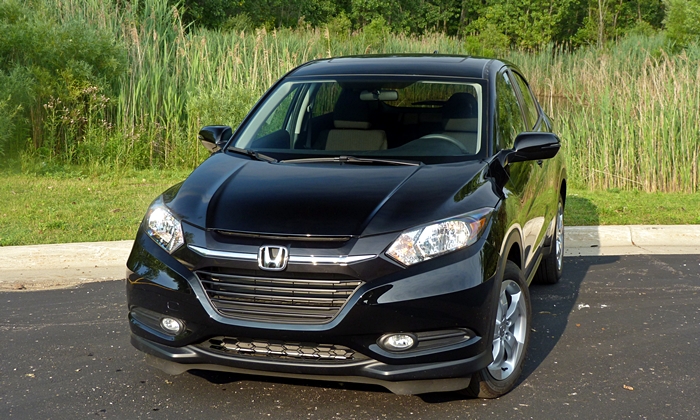
The CR-V has suffered through a series of weird faces. The HR-V's works better.
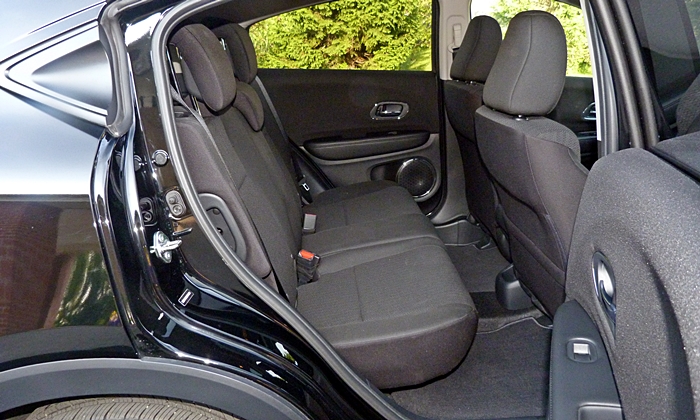
So much rear headroom and rear legroom that you might not need a larger crossover.
| Feature availability |
 Better
Worse
Better
Worse
|
Small crossovers will often be bought for young drivers. As such, advanced safety features are welcome. Unfortunately, neither the HR-V nor the Trax offers forward collision warning, automatic braking, lane departure warning, or blind spot warning. You can get a passenger side blind spot camera on the HR-V, but the Trax counters with standard rear side airbags, such that they roughly tie for a spot near the iffy class average. The Buick Encore, closely related to the Trax, offers a full array of collision warning systems. The Mazda CX-3 and Subaru XV Crosstrek offer these plus automatic braking.
| Controls and instruments |
 Better
Worse
Better
Worse
|
Honda has decided that knobs are no longer necessary on audio systems. I'm not a fan of this decision. The HR-V's touch-sensitive control panel for the heating and AC works well enough despite also lacking knobs, though.
| |
Compared to the Trax |
| Exterior styling |
 Better
Worse
Better
Worse
|
I can't stand the butt-heavy, aesthetically confused exterior of the Honda CR-V. Other recent Honda designs have also included more than their fair share of questionable elements. So I was surprised by how much I grew to like the exterior styling of the new HR-V over the course of my week with it. The small crossover appears especially sleek and sporty from the rear quarter. The Trax appears chunky and even clunky in comparison.
This said, I find the Mazda CX-3 and Fiat 500X more attractive.
| Interior styling |
 Better
Worse
Better
Worse
|
Inside the HR-V is also more stylish than other recent Hondas, and than the Trax. I especially like the sporty shape of the center console and how the instrument panel bends to cant the center stack towards the driver. Materials are also a step up, no doubt a reaction to the criticism received by the bargain basement interior of the 2012 Civic.
One detail I've had enough of, though. Honda's rushed redesign for the Civic included yards of molded-in "stitching" on the instrument panel. They've gifted the HR-V with the same. While I didn't mind this treatment in the Civic--that interior needed all of the help it could get--the HR-V's interior design and materials are strong enough to pass muster without such artifice.
| Handling |
 Better
Worse
Better
Worse
|
The Honda HR-V handles with commendable balance and control in typical driving. Push it harder, though, and both understeer and body lean ramp up quickly. Much the same can be said of the Trax. You'll find more capable and entertaining handling in the MINI, Nissan, Mazda, or FIAT (likely in this descending order).
| Ride smoothness |
 Better
Worse
Better
Worse
|
The HR-V's handling might not be the sportiest, but it rides much more smoothly and less mushily than I expected given the brand's recent history. In this area it's among the class leaders. Sportier competitors tend to kick and jostle more across imperfect pavement. As long as its engine isn't being exercised, the HR-V is also among the quietest members of the segment. If not for the front seats, it would be a good candidate for long drives.
Hondas continued to sell well even when their styling, interior materials, fuel economy, and quietness fell well behind some competitors. Why? They remained reliable, practical, and inexpensive to own. The new HR-V maintains these strengths, even expands on them in terms of practicality, while making gains in styling, fuel economy, and ride quality. The combination of sporty styling with an exceptionally roomy interior borders on magical. Add in a low price and good fuel economy, and the new HR-V delivers what many car buyers are now looking for. Result: strong sales.
But everyone won't be happy with the HR-V. Its engine is weak and buzzy, its handling is far less sporty than its styling, and its front seats can be uncomfortable. For a fun driving experience and more comfortable seats you'll want to look elsewhere, if not to the Chevrolet Trax. Not looking for fun, find that that Honda's seats fit you well enough, and care mostly about reliability, economy, and practicality? Then while the HR-V could be the best fit in this segment, there's a better Fit within the Honda lineup.
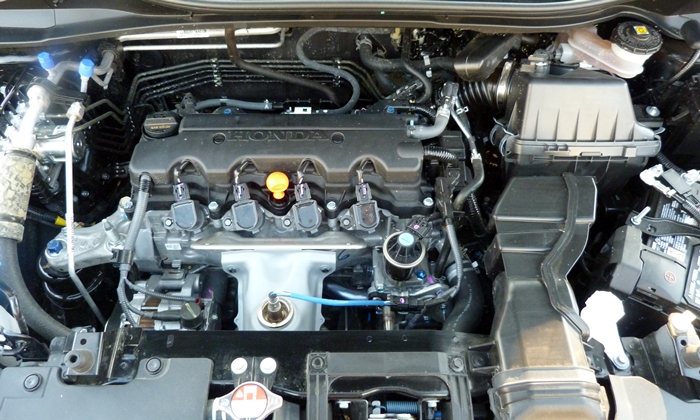
Engine from the Civic: too much buzzing, too little grunt.
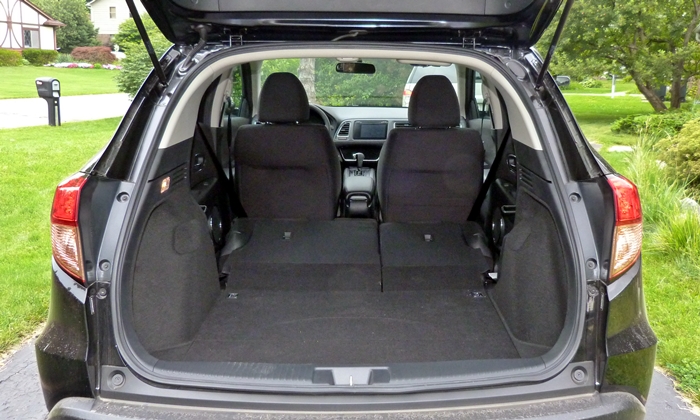
Thanks to clever packaging, the rear seat folds unusually low and flat.
See more 2016 Honda HR-V photos
Honda and Chevrolet each provided an insured car for a week with a tank of gas.











